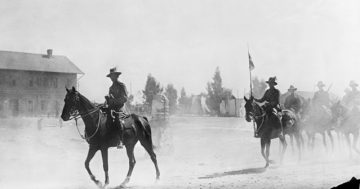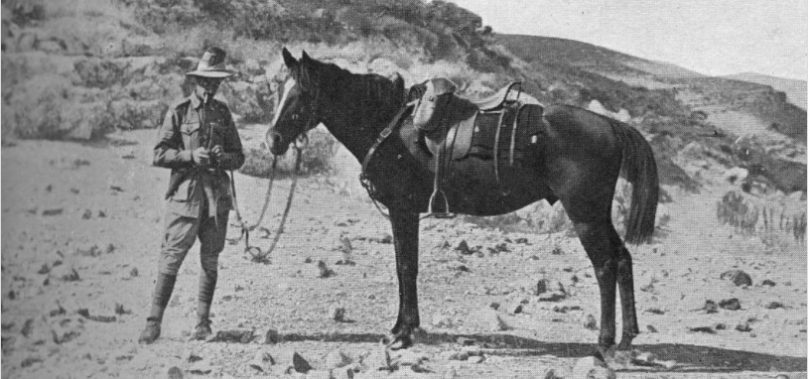
‘Bill the Bastard’ and Major Michael Shanahan. Photo: Australian War Memorial.
Stubbornness, tenacity and courage are words used to describe the temperament of one of Australia’s greatest warhorses, but they also absolutely characterise the endeavours of a small Hilltops community in honouring that horse.
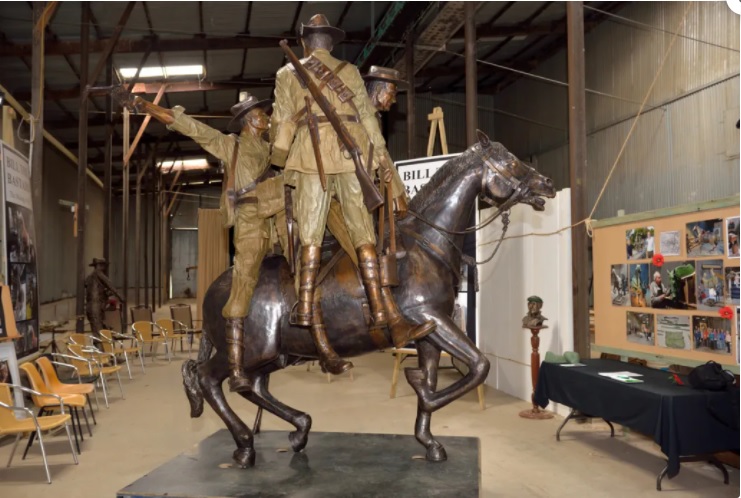
Bill the Bastard will now be moved from the studio of sculptor Carl Valerius to Mill Park in the centre of Harden-Murrumburrah. Photo: Supplied.
Years were spent laboriously campaigning, fundraising and beseeching individuals, organisations, businesses, philanthropists and politicians to chip in for the $790,000 project that, in coming weeks, will be forever cemented in Harden-Murrumburrah.
In doing so, Bill the Bastard – a Waler warhorse – has finally earned a permanent place of rest and reverence at the centre of the small twin town which is the birthplace of the First Australian Light Horse Brigade.
The 17.1 hand, fiery, cranky chestnut gelding famous for his buck and pluck, can now be seen in full scale, his bronzed form crafted by local sculptor Carl Valerius – an enduring reminder of his significant and stirring contribution to Australian war efforts in the Middle East.
Notoriously cantankerous, this was a steed considered unrideable. His was a reputation that distinguished, preceded and post-dated him in the form of poem, book and ballad. And an annual horse race in Warrnambool.
Bill was among 29,348 horses shipped from Australia to the Middle East in 1914 to fight in World War I. On the journey, he was cared for by AB “Banjo” Paterson. Yes, the poet.
Paterson was also a war correspondent, an avid equestrian and later commanded the Australian Remount Squadron. But a line in Paterson’s diary from the voyage summed up Bill’s character perfectly: ‘you can’t lead Bill the Bastard to anything and you certainly can’t make him drink”.
Yet, Bill’s size, power, intelligence and unmatched courage materialised at Gallipoli, the desert campaigns of Egypt and Palestine, catching the attention of Major General Michael Shanahan, the only rider able to bond with Bill.
It was in August 2016 that Bill rose to prominence at the pivotal Battle of Romani on the Sinai Peninsular.
In the 50-degree heat of the desert and with the Turks and Australians just 35 metres apart, the battle was fierce with the right flank under assault.
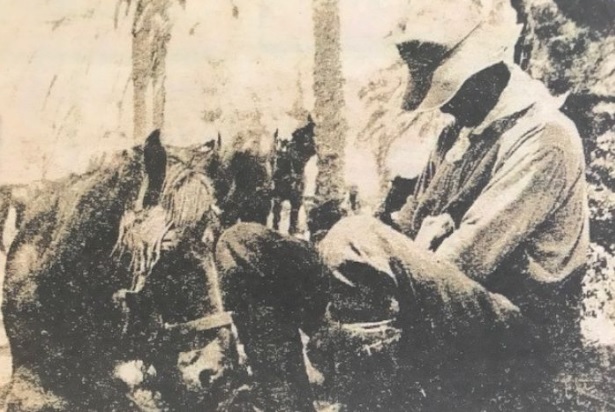
Bill and Major Michael Shanahan resting under a date palm: Photo: The War Horse Memorial.
Amid the conflict, Major General Michael Shanahan astride Bill spotted four Tasmanian troopers surrounded by Turks, unable to escape after their horses had either fled or been shot. Bill stood his ground and even resisted his natural urge to buck as the soldiers scrambled aboard – three men on his back and one balanced on each stirrup. He galloped through the soft sand and gunfire for more than a kilometre to bring them to safety, thus earning Shanahan the Distinguished Service Order.
Shanahan and Bill rode back into battle and fought for a further six hours until Shanahan passed out after he was shot in the leg. Sensing this, Bill carried him three kilometres back to the army base. Any other horse would most likely have collapsed hours earlier – one general went through 17 horses that same night.
After his instrumental efforts in the Battle of Romani, Bill’s reward was retirement from life as a saddle horse, serving as an officer’s packhorse for the remainder of the war. He was seen as a symbol of strength to the troops and carried machine guns in the famous Battle of Beersheba.
While he died peacefully in 1924 with his own grave at Walker’s Ridge in Gallipoli, his statue will keep quiet company, across the road from a coterie of lionhearted locals whose contribution to Australia’s warhorse efforts will live in perpetuity in the heart of Harden-Murrumburrah.
The 1st Australian Light Horse & Australian Light Horse Memorial – designed and created by sculptor Carl Valerius – consists of a large granite block together with a wall of remembrance and an allegorical garden near Murrimboola Creek.
The memorial features bronze sculptures of Corporal William Bradford of the 1st Australian Light Horse, a small-scale representation of the ‘Retreat at Romani’ and a diorama of Beersheba.
Corporal William Bradford’s name still lives on through his grandson, Nubba farmer Wal Bradford, who has continued the family’s love of horses and has been involved with the Murrumburrah Light Horse Heritage Troop for almost 14 years.
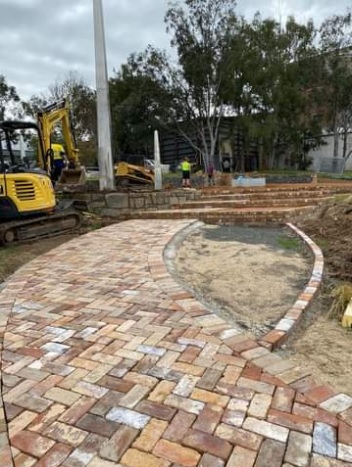
Preparations have been well underway at the location where the Bill the Bastard statue at Mill Park in Harden-Murrumburrah will be erected. Photo: Harden Murrumburrah Rotary Club.
The Murrumburrah Light Horse Heritage Troop keeps alive the spirit of the mounted horsemen.
Brian Dunn and Lorraine Brown of Harden are also current members and with other members of the troop, regularly travel across NSW and into Canberra for ceremonial events.
Nearby is the majestic life-sized statue of Major-General Kenneth Mackay – created by Louis Laumen – whose rallying efforts led to the very first call-up muster and enrolments to the 1st Australian Horse at Harden-Murrumburrah in August 1897.
Mackay – from Wallendbeen near Cootamundra – had raised the first Australian Volunteer Horse Regiment in Camden in 1885.
This was later known as 1st Australian Horse, then 3rd Australian Light Horse, 11th Australian Light Horse and finally the 7th Australian Light Horse.
Bill the Bastard will be situated in Mill Park behind a 15-metre tall stainless steel obelisk, The Federation Star, one of three designed and made by local engineer Russell Muirhead, erected to celebrate the centenary of Federation, salute wartime service and also pay tribute to the Murrumboola Wiradjuri people.
Harden Regional Development Corporation CEO Chris Ireland said a small ceremony would be held early in 2022 to officially mark Bill the Bastard’s unveiling to the public.
“It’s taken a long time to get him to this point and I think we’re all delighted with the result,” Chris said.







